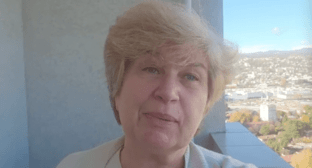25 May 2004, 19:57
Human rights leader denies political process in Chechnya
A book has been presented in Moscow titled Chechnya 2003: Political Process behind the Looking-Glass. The book has been prepared by the Moscow Helsinki Group in association with the Caucasian Knot Internet-based information and analysis media outlet and the Memorial Human Rights Center. It included the results of unique monitoring at the presidential election in the Chechen Republic carried out by Caucasian Knot and the Moscow Helsinki Group, a series of authorial articles, a chronicle of election-related events and a chronicle of violence and human rights violations providing the background for the so-called political process and peaceful settlement in Chechnya.
Tatiana Lokshina, director of the expertise and analysis center at the Moscow Helsinki Group and one of the authors of the mentioned book, commented on its publication to Caucasian Knot.
Tatiana Lokshina: For me, the publication of the book Chechnya 2003: Political Process behind the Looking-Glass is a sad event rather than pleasant. This is a book that says that there is no actual political process in Chechnya. After all, it is clear that Akhmat Kadyrov was not elected, he was appointed. Meanwhile, such government cannot be legitimate, because legitimate elections are not conducted in the situation of a military conflict. Kadyrov's death gives sad evidence that we are right, unfortunately. It is of interest here that the federal center has shown a somewhat strange reaction to this event, losing its chance after May 9 to declare a state of emergency and direct presidential rule in Chechnya. Government has once again pretended that nothing is going on instead of trying to launch an actual political process in the republic and searching for new ways to solve the problem. Another election is coming next. To the best of my knowledge, it is scheduled for late August: a candidate will emerge, and another show of an election campaign will start.
Caucasian Knot: In this light, what do you think about Ramzan Kadyrov's chances? And overall, to what extent such continuity of power is typical for Chechnya?
Tatiana Lokshina: As far as the Chechen mentality is concerned, Ramzan Kadyrov's succession in power to Akhmat Kadyrov is unacceptable. Such dynasties are not typical for the Chechens at all. In this, Chechnya is much different from many other places in the former USSR. But there are some other factors of importance here, too. Two to four thousand well-armed people are now behind Ramzan Kadyrov, so he is difficult to sort out. Government may therefore believe it easier to favor him - as successor to the throne, probably. For some reason, though, they have forgotten that he will have even more armed people in a year because of that. Government does no strategic planning in present-day Russia. Prospects for the long-term are not considered: they do what is easier for the time being. Thus, for instance, it was once much easier to promote Akhmat Kadyrov to president than sort him out.
Caucasian Knot: Will your book reach the hands of government representatives?
Tatiana Lokshina: Yes, we will do our best for that. We will be sending this book to the presidential administration and members of the Commission on Human Rights for the Russian president and Duma members. Besides, we are going to make use of the resources provided by the Commissioner on Human Rights in the Russian Federation to promote and disseminate the book through government channels. This book is not only meant for civil servants, though. We would like journalists, members of human rights organizations and just people who are interested in this problem to read it. The book features many authorial articles, and it reads easily thanks to that. I will try to do my best, too, to see the book reach libraries. We will probably distribute it among Russian higher education institutions. Besides, the full-text version of the book has been included in another book about elections in Russia by the Moscow Helsinki Group. It seems to me, though, the former is to a significantly greater extent about what is going on in Chechnya now, not about elections as they are.
Caucasian Knot: To the best of my knowledge, the book has been published in English, too?
Tatiana Lokshina: Yes. Well, basically, the overall circulation is 1,000 copies in Russian and 500 copies in English. The English version was published about a month before the Russian one and was sold practically at once. Now I hope we will be able to find opportunities for an additional circulation. In late January this year, the book was presented to the Parliamentary Assembly of the Council of Europe in the form of a brochure. It was not in print by that moment. A presentation was conducted at the UN Commission of Human Rights, and the book was also distributed at several major international conferences and sent to members of the Parliamentary Assembly of the Council of Europe - just to some of them, unfortunately.
Caucasian Knot: How do you think the Russian government representatives that will happen to have your book will respond to it?
Tatiana Lokshina: I remember President Putin frowning very sternly when he happened to read one of the Memorial Human Rights Center's reports about the situation in the Chechen Republic. I am afraid this book will cause a negative response, too. However, there is always some hope that government representatives will think about what is going on at least this time, after all. Because if our government had thought about some problems beforehand, the situation would be much better not only in Chechnya but also throughout Russia now.
Editors note: See also the article "Collected articles, devoted to elections in Chechnya, presented in Moscow".
Author: Ksenia Ladygina, CK correspondent Source: Caucasian Knot




